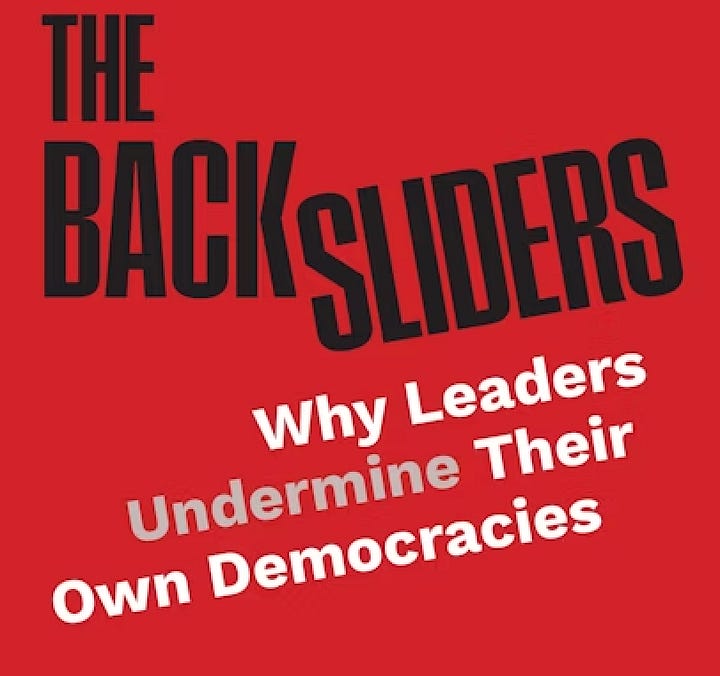The Backsliders
My interview with University of Chicago Professor Susan Stokes on her new book on democratic erosion around the globe


This post is an interview with Susan Stokes, a colleague of mine who is a Professor of Political Science at the University of Chicago and the author of the new book The Backsliders. Sue is a leading expert on democratic erosion. Her book, based on a wealth of rigorous original analysis, examines why democracy is under assault both in the US and abroad by elected leaders that are entrusted to preserve it. That is what motivates this post. Since I’ve been covering threats to democracy here at The Good Society and do research of my own in this area, I wanted to dig deeper. Her insights into contemporary challenges to democracy are crucial in the current moment. You can pre-order her book, which will be available September 9, for more.
1) Why did you write this book?
When I was in graduate school, a slew of dictatorships were collapsing and were replaced by elected governments. This wave started in Latin America and then spread to Central and Eastern Europe and to Russia. That was an optimistic time. Even though the emerging elected systems were uncertain and sometimes fragile, much of the world was rejecting authoritarian rule.
Now, decades later, an equally surprising but less optimistic change is taking place. Elected governments in about two dozen countries are edging in an autocratic direction – sometimes not edging but lurching in that direction. I felt compelled to try to make sense of this unexpected development. As a scholar of comparative politics, I’m deeply aware of national, cultural, and societal differences. But with regard to backsliding governments, there is an eerie sameness to the strategies that they deploy, what we call “the playbook.” They don’t all do exactly the same thing, but they often aim at the same set of targets (the press, the courts, the legislature and opposition political leaders, the civil bureaucracy, universities, and so forth).
I also felt compelled to try to convey what strategies of resistance have been effective: what role civil society, professional associations, lawyers and civil servants, and voters can each play to try to sustain and improve democratic governance.
2) For many years, political scientists thought that wealthy, advanced democracies like the US were practically immune to democratic erosion. Why was that wrong?
The main source of democratic instability in the 20th century was military coups, and coups were very rare in wealthy countries. Add to that the factor of the age of a democracy – the longer a county survived as a democracy, the less likely it was to collapse – and countries like the U.S. indeed appeared safe. (Though of course our democracy had many historic and contemporary flaws and worked better for some populations than for others.)
But in the 21st century, things have changed. Democracies around the world still fall prey to military intervention. But more common is democratic erosion or democratic backsliding, when an elected president or prime minister undermines his or her own democratic institutions. They aim to aggrandize powers in the executive and to weaken mechanisms of accountability. They weaken horizontal accountability, imposed, under normal circumstances, by co-equal branches of government, whistle-blowers, and autonomous public agencies, and vertical accountability, the ability of voters to elect politicians they favor and turn out of office incumbents whom they find lacking.
In the 21st-century world of democratic erosion, income inequality matters more for democratic resilience or erosion than does income level or national wealth. Together with Eli Rau of Tec de Monterrey University, we undertook a cross-national statistical study of all democracies, and found an incredibly robust connection between inequality and the risk of democratic erosion. Income level – a country’s national wealth or level of economic development – did matter, but it matters less than inequality. Just as interesting, we found that the age of democracy didn’t matter.
In the U.S., our high levels of inequality place us at heightened risk, while our status as the world’s oldest democracy does not protect us from backsliding.
3) You point to income inequality as a key structural factor that puts democracies at risk. What is so pernicious about inequality if, at the same time, most groups of people are becoming better off in absolute terms?
Income (and wealth) inequalities induce frustration, resentment at those who seem to have jumped ahead of us in line, a loss of confidence in institutions, and partisan polarization. These effects are not all spontaneous among the populace; ambitious politicians take advantage of inequality to encourage anger, distrust, and polarization. Would-be autocrats benefit from governing over a polarized policy. Their supporters will tolerate abuses of democracy if they think that the other side coming to power would be catastrophic.
Backsliding leaders also benefit from cynicism about institutions. They tell people not to worry about the president’s attacks on the courts, the civil administration, and other institutions; all of them are actually corrupt and rotten to the core. This latter rhetorical strategy is what I call trash-talking democracy. In my book, I offer evidence that trash-talking democracy works: it undermines institutional confidence and encourages a nihilistic, we-need-to-burn-this-whole-thing-down mentality. And the leader’s message is: burn it down and leave me with all the power.
4) Inequality has risen in most advanced democracies over the last 30-40 years. But not all of them are suffering from democratic backsliding. Democracy is holding in places like Canada, Australia, France, and Japan. Backsliding requires a leader with authoritarian tendencies who aims to take and hold power by stoking political polarization or belittling the value of democracy. Why do these leaders arise in some democracies but not others?
It's a great observation and question. You could say, for example, that the “objective” conditions for democratic backsliding were present in the U.S. during the presidency of Barack Obama. Obama venerates America’s democratic and republican traditions. Trump does not. So it does take an individual with a certain set of values and ambitions to attack the institutions of his or her democracy.
On the other hand, we need to ask, how do politicians who are willing to shred democratic institutions come to power? They are encouraged by certain developments in their countries’ party systems. In terms of ideology or programmatic profiles, backsliders tend either to be right-wing ethnonationalists or left-wing populists. Right-wing ethnonationalist parties have emerged and become electorally successful mainly in the Global North. The background of their emergence and growth was traditional center-left, social democratic parties’ growing away from their working-class constituencies in the latter decades of the 20th century. This at the same time that conservative, pro-business parties stuck to economic models that allowed lower income groups to fall behind. As new parties, or new factions of parties, the right-wing ethnonationalists had extra incentives to encourage cynicism about “elite” institutions, including legacy political parties and leaderships.
The story is different in the Global South, where democratic erosion is more likely to be carried out by left-wing populists, leaders like Mexico’s Andrés Manuel López Obrador or South Africa’s Jacob Zuma. The larger point is that both a personal profile and a political context lie behind the rise of backsliders; they need to be inclined to break their democracies but they are also the products of complex changes in party systems and societies that produces them.
The tolerance of voters for backsliding, which I mentioned earlier, is also a key factor in explaining why backsliders emerge in some countries but not others. As I show in my book, some of the conditions were ripe for backsliding in the U.K. during Boris Johnson’s government (2019-2022), and Johnson experimented with elements of the backsliders’ playbook. He closed or “prorogued” parliament in a manner later found unlawful by Britain’s Supreme Court. Johnson questioned jurists’ legitimacy when they decided against his wishes, imposed limits on demonstrations, threatened to retaliate against media organs that were critical of him, and adopted seemingly unnecessary voter ID laws. But Johnson fell afoul of public opinion, including among Conservative voters, and was therefore forced out of office by his own party. The story with Donald Trump and his base could not contrast more sharply.
5) In only very few countries around the world is inequality declining today. And it's not declining in most of the democracies that you identify as backsliding. What does that mean for the fate of democracy in the ones already backsliding, and for democracy more broadly?
This is a key question, and one that deserves more study. If inequality helps bring backsliders to power, it might seem like they would have little incentive to improve distribution. But it’s probably more complicated than that. If a left-wing populist comes to power by railing against the rich and promising to make life better for the poor and then doesn’t make good on these promises, he makes himself vulnerable. We do see these kinds of leaders using their offices to improve distribution. For instance López Obrador in Mexico raised the minimum wage and enhanced retirement payments, at the same time that he tried to undermine the independence of the courts and the national election administration body. And Evo Morales in Bolivia exalted the position of indigenous minorities, overseeing the drafting of a new, “plurinational” constitution.
The incentives facing right-wing ethnonationalists are more complex. Their power relies on coalitions of low-income voters and business interests, the latter reflecting the origins of many of these leaders in legacy conservative parties. In some instances, these leaders and their parties shift toward a more pro-social spending stance, somewhere in between the legacy left and the legacy right. In others, they deploy a strategy of blaming other groups – ethnic, religious, and racial minorities, immigrants – for their working-class followers’ plights and move rather slowly on any redistribution. The ultimate example of this is Donald Trump, who deploys anti-immigrant discourse and rhetorically embraces the working class, but pursues anti-redistributive fiscal and spending policies.
I believe we’re too early in this story to know whether right-wing ethnonationalists who fail to improve income distribution and the plight of working-class voters will push countries further down the path toward autocracy, or whether it will encourage these voters to reject the backsliding leaders and parties and return to more conventional center-left parties.
6) Where do you think American democracy is heading in light of your arguments in the book, and what is the most promising or plausible path back to a stable democracy?
The 64 million dollar question! Right now, Donald Trump’s popularity has dropped, and he has always been a president with strong negatives. His policies, and the way they are being implemented, are also unpopular. Voters who supported Trump in 2024 because of the cost of living (which reflects inequality) and inflation are disappointed. On the other hand, he and his party are racing to undercut vertical accountability. They are trying to loosen the connection between their performance, viewed by many as poor, and electoral accountability in the 2026 midterms. They are trying to do this by a mix of misinformation about economic performance alongside of massive gerrymandering in several states.
If the economy were to tank – with rising inflation and unemployment and much slowed growth – support for Trump and his allies might fall off a cliff, in which case vertical accountability would still have a chance to operate. Recall that George W. Bush’s popularity soared after 9/11 to 92%; in the midst of an unpopular Iraq War and the global financial crisis, it sank to 22% at the end of his term.
What probably matters most is not that Trump’s personal unpopularity become more generalized among the public, but that many Americans come to connect his poor performance with his gutting of institutions and rights, like accountability and the rule of law.
Leading images are of Susan Stokes and the cover of her new book, The Backsliders (Princeton University Press).

